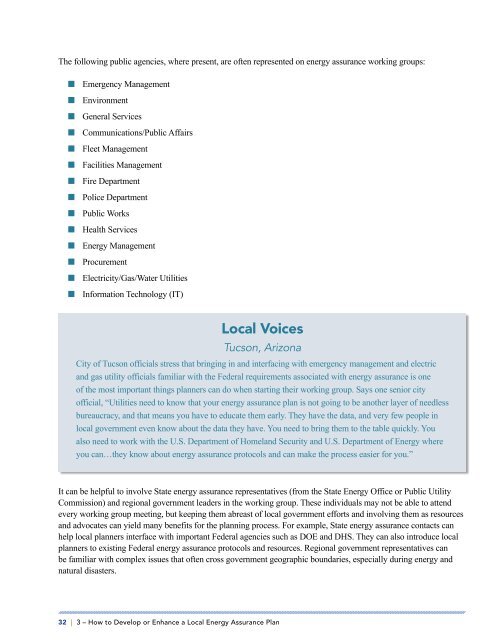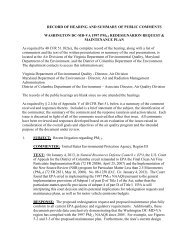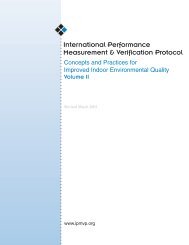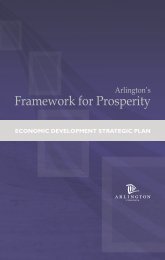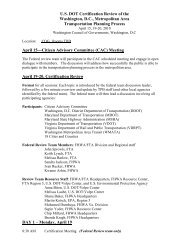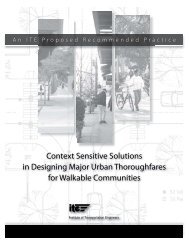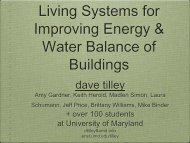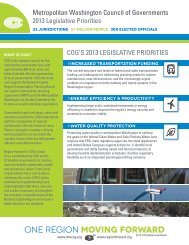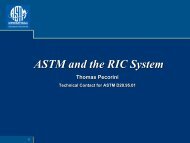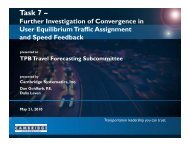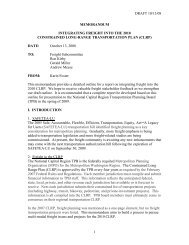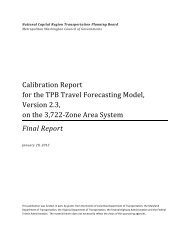PTI Local Government Energy Assurance Guidelines - Metropolitan ...
PTI Local Government Energy Assurance Guidelines - Metropolitan ...
PTI Local Government Energy Assurance Guidelines - Metropolitan ...
You also want an ePaper? Increase the reach of your titles
YUMPU automatically turns print PDFs into web optimized ePapers that Google loves.
The following public agencies, where present, are often represented on energy assurance working groups:<br />
■■<br />
■■<br />
■■<br />
■■<br />
■■<br />
■■<br />
■■<br />
■■<br />
■■<br />
■■<br />
■■<br />
■■<br />
■■<br />
■■<br />
Emergency Management<br />
Environment<br />
General Services<br />
Communications/Public Affairs<br />
Fleet Management<br />
Facilities Management<br />
Fire Department<br />
Police Department<br />
Public Works<br />
Health Services<br />
<strong>Energy</strong> Management<br />
Procurement<br />
Electricity/Gas/Water Utilities<br />
Information Technology (IT)<br />
<strong>Local</strong> Voices<br />
Tucson, Arizona<br />
City of Tucson officials stress that bringing in and interfacing with emergency management and electric<br />
and gas utility officials familiar with the Federal requirements associated with energy assurance is one<br />
of the most important things planners can do when starting their working group. Says one senior city<br />
official, “Utilities need to know that your energy assurance plan is not going to be another layer of needless<br />
bureaucracy, and that means you have to educate them early. They have the data, and very few people in<br />
local government even know about the data they have. You need to bring them to the table quickly. You<br />
also need to work with the U.S. Department of Homeland Security and U.S. Department of <strong>Energy</strong> where<br />
you can…they know about energy assurance protocols and can make the process easier for you.”<br />
It can be helpful to involve State energy assurance representatives (from the State <strong>Energy</strong> Office or Public Utility<br />
Commission) and regional government leaders in the working group. These individuals may not be able to attend<br />
every working group meeting, but keeping them abreast of local government efforts and involving them as resources<br />
and advocates can yield many benefits for the planning process. For example, State energy assurance contacts can<br />
help local planners interface with important Federal agencies such as DOE and DHS. They can also introduce local<br />
planners to existing Federal energy assurance protocols and resources. Regional government representatives can<br />
be familiar with complex issues that often cross government geographic boundaries, especially during energy and<br />
natural disasters.<br />
32 | 3 – How to Develop or Enhance a <strong>Local</strong> <strong>Energy</strong> <strong>Assurance</strong> Plan


